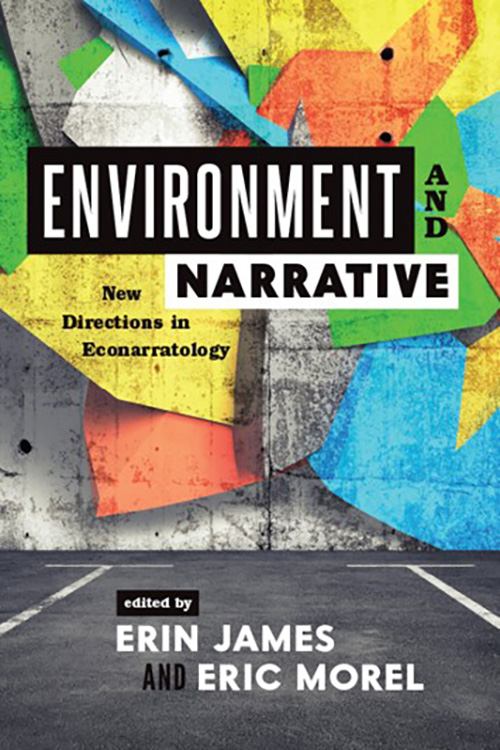Erin James
Professor of English; Co-Director, The Confluence Lab; Affiliate Faculty, Environmental Science
208 Brink Hall
English Department
University of Idaho
875 Perimeter Drive MS 1102
Moscow, Idaho 83844-1102
Erin James teaches world literatures in English, critical theory, and literatures of the climate crisis.
- B.A.H., English and Biology, Acadia University, 2002
- M.A., Colonial and Postcolonial Literatures in English, University of Warwick, 2003
- Ph.D., Comparative Literature, University of Warwick, 2008
Courses
- ENGL 310: Critical Theory
- ENGL 322: Climate Change Fiction
- ENGL 385: World Literature
- ENGL 464: Literature Oppression and Resistance
- ENGL 490: Senior Seminar
- ENGL 504: Topics in Anglophone Literature
- ENGL 511: Studies in Literary Criticism
- ENGL 525: Studies in Environmental Humanities
Erin James joined the English Department at University of Idaho in 2012. Her first book The Storyworld Accord: Econarratology and Postcolonial Narratives (University of Nebraska Press, 2015) explores the intersections of ecocriticism, postcolonialism, and narrative theory and questions the role narratives stand to play in a response to today’s environmental crisis. It was shortlisted for the Association for the Study of Literature and Environment’s (ASLE) Best Ecocriticism Book award and won the International Society for the Study of Narrative’s (ISSN) Perkins Prize for Best Book in Narrative Studies. Her second book, Narrative in the Anthropocene (Ohio State University Press, 2022), considers the links between storytelling and anthropogenic climate change; it was also short-listed for the ASLE Best Ecocriticism Book Award. In addition to these two books, Erin co-edited Environment and Narrative: New Directions in Econarratology (Ohio State University Press, 2022) with Eric Morel.
Erin has also published essays in Cambridge Critical Concepts: Nature and Literary Studies (Cambridge UP, 2023), SubStance, DIEGESIS, Poetics Today, The Language of Plants (U of Minnesota Press 2017), the Journal of Narrative Theory, the Journal of Commonwealth and Postcolonial Literature, The Bioregional Imagination (U of Georgia P 2012), and Teaching Ecocriticism and Green Cultural Studies (Palgrave 2012).
At University of Idaho, Erin teaches courses on world literatures in English, postcolonial literatures and theory, ecocriticism, and the environmental humanities, narratology and narrative theory, and critical theory. She is also the co-founder and co-director of the interdisciplinary Confluence Lab, which uses interdisciplinary methods to study environmental issues in rural communities. With her Confluence Lab collaborators, Erin has received major grants from the National Science Foundation and the Mellon Foundation. She is the former mentoring program co-coordinator for the Association for the Study of Literature and Environment and a past president of the International Society for the Study of Narrative.
-
Narrative Theory
-
Environmental Humanities
-
Interdisciplinary Research
-
Postcolonial Literatures and Theory
Books
-
Narrative in the Anthropocene. Columbus: Ohio State University Press, 2022.
-
Environment and Narrative: New Directions in Econarratology. Erin James and Eric Morel, eds. Columbus: Ohio State University Press, 2020.
-
The Storyworld Accord: Econarratology and Postcolonial Narratives. University of Nebraska Press, 2015.
Articles & Book Chapters
- “Unsettling Fire: Recognizing Narrative Compassion.” Erin James, Jack Kredell, Jennifer Ladino, Teresa Cavazos Cohn, Kayla Bordelon, and Michael Decker. Forthcoming in Narrative, May 2024.
- “Narrating Nature.” Cambridge Critical Concepts: Nature and Literary Studies. Peter Remien and Scott Slovic, eds. Cambridge: 2022. 325-338.
- “(Life) Narrative in the Posthuman Anthropocene: Erin James in Conversation with Birgit Spengler.” Life Writing in the Posthuman Anthropocene, Ina Batzke, Lea Espinoza Garrido, and Linda M. Hess, eds. Palgrave Macmillan, 2021.
- “Afterword: Econarratology Then, Now, and Later.” SubStance, s50.3 (2021): 150-161.
- “The Value of ‘Old’ Stories: A Response to Marco Caracciolo’s ‘Negotiating Stories in the Anthropocene’”, DIEGESIS 9.2 (2020): 34-44.
“Nonhuman Fictional Characters and the Empathy-Altruism Hypothesis.” Poetics Today 40.3 (2019): 579-596. - “What the Plant Says: Plant Narrators and the Ecosocial Imaginary.” The Language of Plants: Science, Philosophy, Literature, and Cinema. Patricia Vieira, Monica Gagliano, and John Ryan, eds. Minneapolis: University of Minnesota Press, 2017.
- “Immersed in the Storyworld: Rotten English and Orality in Ken Saro-Wiwa’s Sozaboy.” Journal of Narrative Theory. 45.3 (Fall 2015).
- “Teaching the Postcolonial Ecocritical Dialogue.” Teaching Ecocriticism and Green Cultural Studies. Greg Garrard, ed. Palgrave Macmillan, 2012. 60 – 71.
- “Bioregionalism, Postcolonial Literatures and Ben Okri’s The Famished Road.” The Bioregional Imagination: Literature, Ecology, Place. Karla Armbruster, Cheryll Glotfelty, and Tom Lynch, eds. University of Georgia Press, 2012. 261 – 77.
- “Doomed Kyoto: Language, Environment and National Interests,” Journal for Commonwealth and Postcolonial Studies. 14.2 (Spring 2007): 83 – 100.
- Andrew W. Mellon Foundation Grant, "Pacific Northwest Just Futures Institute for Racial and Climate Justice" (in collaboration with University of Oregon and Whitman College, ($4.52 Million;). The UI portion of this project is "Stories of Fire: A Pacific Northwest Climate Justice Atlas" (Co-PI; (340,437)
- National Science Foundation Advancing Informal STEM Learning Grant, "Communicating Fire: Integrative Informal STEM Learning Through Participatory Narratives" ($299.911)
- CLASS Summer Research Grant, University of Idaho, 2022 and 2018
- Excellence in Interdisciplinary and Collaborative Efforts, University of Idaho 2020-2021
- President's Mid-Career Award, University of Idaho, 2019-2020
- Office of Research and Economic Development Start-Up Funds, Confluence Lab, 2018 ($2,000)
- Excellence in Interdisciplinary and Collaborative Efforts, University of Idaho, 2020-2021
- Teaching Excellence Award, University of Idaho, 2016-2017
- Alumni Award for Excellence, University of Idaho, 2016
- Seed Grant, University of Idaho, 2014 ($12,000)
- Summer Faculty Research Stipend, University of Idaho, 2012 ($5,000)








